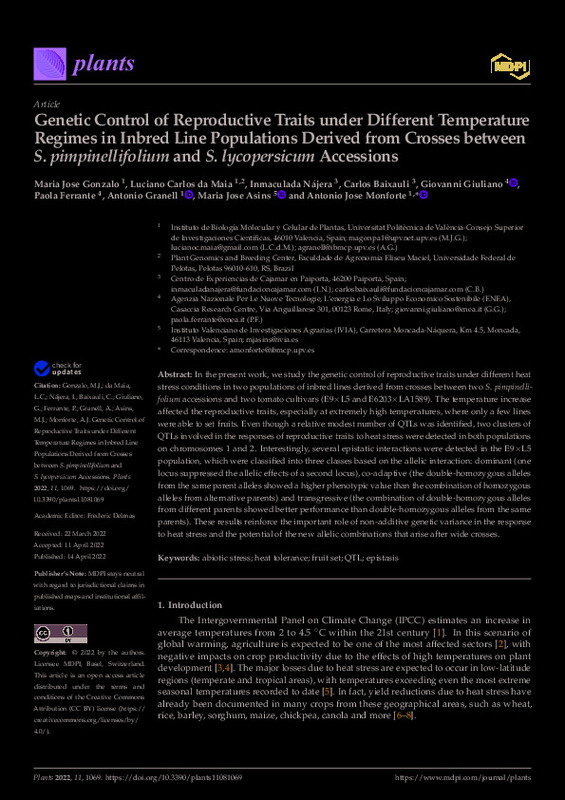JavaScript is disabled for your browser. Some features of this site may not work without it.
Buscar en RiuNet
Listar
Mi cuenta
Estadísticas
Ayuda RiuNet
Admin. UPV
Genetic Control of Reproductive Traits under Different Temperature Regimes in Inbred Line Populations Derived from Crosses between S. pimpinellifolium and S. lycopersicum Accessions
Mostrar el registro sencillo del ítem
Ficheros en el ítem
| dc.contributor.author | Gonzalo, Maria Jose
|
es_ES |
| dc.contributor.author | da Maia, Luciano Carlos
|
es_ES |
| dc.contributor.author | Najera, Inmaculada
|
es_ES |
| dc.contributor.author | Bauxauli, Carlos
|
es_ES |
| dc.contributor.author | Giuliano, Giovanni
|
es_ES |
| dc.contributor.author | Ferrante, Paola
|
es_ES |
| dc.contributor.author | GRANELL RICHART, ANTONIO
|
es_ES |
| dc.contributor.author | Asins, Maria Jose
|
es_ES |
| dc.contributor.author | Monforte Gilabert, Antonio José
|
es_ES |
| dc.date.accessioned | 2023-05-10T18:01:28Z | |
| dc.date.available | 2023-05-10T18:01:28Z | |
| dc.date.issued | 2022-04 | es_ES |
| dc.identifier.uri | http://hdl.handle.net/10251/193246 | |
| dc.description.abstract | [EN] In the present work, we study the genetic control of reproductive traits under different heat stress conditions in two populations of inbred lines derived from crosses between two S. pimpinellifolium accessions and two tomato cultivars (E9 x L5 and E6203 x LA1589). The temperature increase affected the reproductive traits, especially at extremely high temperatures, where only a few lines were able to set fruits. Even though a relative modest number of QTLs was identified, two clusters of QTLs involved in the responses of reproductive traits to heat stress were detected in both populations on chromosomes 1 and 2. Interestingly, several epistatic interactions were detected in the E9 x L5 population, which were classified into three classes based on the allelic interaction: dominant (one locus suppressed the allelic effects of a second locus), co-adaptive (the double-homozygous alleles from the same parent alleles showed a higher phenotypic value than the combination of homozygous alleles from alternative parents) and transgressive (the combination of double-homozygous alleles from different parents showed better performance than double-homozygous alleles from the same parents). These results reinforce the important role of non-additive genetic variance in the response to heat stress and the potential of the new allelic combinations that arise after wide crosses. | es_ES |
| dc.description.sponsorship | This research was funded by the European Commission H2020 Research and Innovation Program through the TomGEM project, grant agreement no. 679796; HARNESSTOM, grant agreement no. 101000716; G2P-SOL, grant agreement no. 677379. L.C.d.M. was supported by the Visiting Professor scholarship 88881.173041/2018-01 from the Coordination for the Improvement of Higher Education Personnel (CAPES), Ministry of Education of Brazil. | es_ES |
| dc.language | Inglés | es_ES |
| dc.publisher | MDPI | es_ES |
| dc.relation.ispartof | Plants | es_ES |
| dc.rights | Reconocimiento (by) | es_ES |
| dc.subject | Abiotic stress | es_ES |
| dc.subject | Heat tolerance | es_ES |
| dc.subject | Fruit set | es_ES |
| dc.subject | QTL | es_ES |
| dc.subject | Epistasis | es_ES |
| dc.title | Genetic Control of Reproductive Traits under Different Temperature Regimes in Inbred Line Populations Derived from Crosses between S. pimpinellifolium and S. lycopersicum Accessions | es_ES |
| dc.type | Artículo | es_ES |
| dc.identifier.doi | 10.3390/plants11081069 | es_ES |
| dc.relation.projectID | info:eu-repo/grantAgreement/EC/H2020/101000716/EU | es_ES |
| dc.relation.projectID | info:eu-repo/grantAgreement/CAPES//88881.173041%2F2018-01//Visiting Professor scholarship / | es_ES |
| dc.relation.projectID | info:eu-repo/grantAgreement/EC/H2020/677379/EU | es_ES |
| dc.relation.projectID | info:eu-repo/grantAgreement/EC/H2020/679796/EU | es_ES |
| dc.rights.accessRights | Abierto | es_ES |
| dc.description.bibliographicCitation | Gonzalo, MJ.; Da Maia, LC.; Najera, I.; Bauxauli, C.; Giuliano, G.; Ferrante, P.; Granell Richart, A.... (2022). Genetic Control of Reproductive Traits under Different Temperature Regimes in Inbred Line Populations Derived from Crosses between S. pimpinellifolium and S. lycopersicum Accessions. Plants. 11(8):1-24. https://doi.org/10.3390/plants11081069 | es_ES |
| dc.description.accrualMethod | S | es_ES |
| dc.relation.publisherversion | https://doi.org/10.3390/plants11081069 | es_ES |
| dc.description.upvformatpinicio | 1 | es_ES |
| dc.description.upvformatpfin | 24 | es_ES |
| dc.type.version | info:eu-repo/semantics/publishedVersion | es_ES |
| dc.description.volume | 11 | es_ES |
| dc.description.issue | 8 | es_ES |
| dc.identifier.eissn | 2223-7747 | es_ES |
| dc.identifier.pmid | 35448797 | es_ES |
| dc.identifier.pmcid | PMC9027731 | es_ES |
| dc.relation.pasarela | S\486916 | es_ES |
| dc.contributor.funder | European Commission | es_ES |
| dc.contributor.funder | Coordenaçao de Aperfeiçoamento de Pessoal de Nível Superior, Brasil | es_ES |








